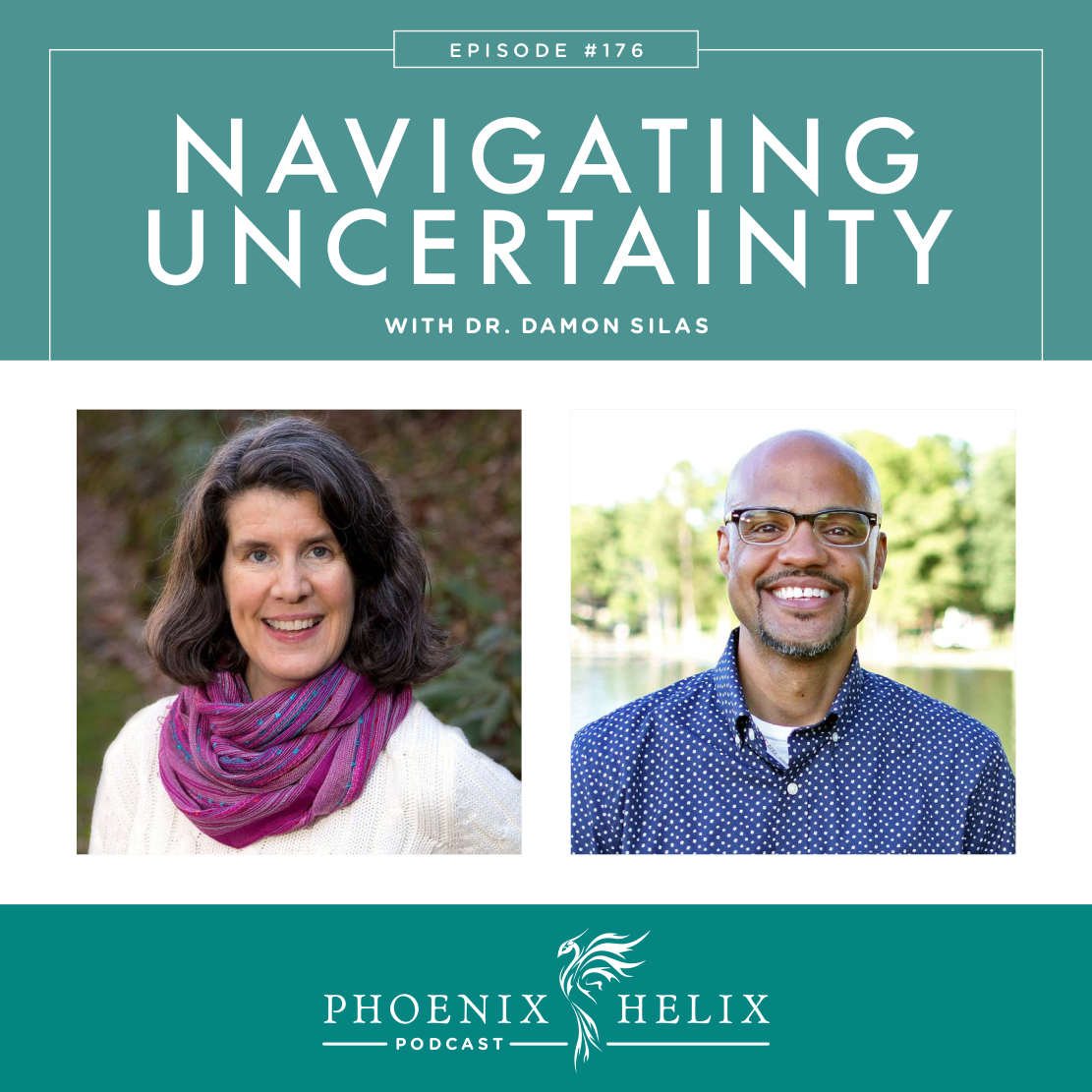Staying Grounded When the World Around You Shifts
We all know that life is uncertain and many things are beyond our control, but that doesn’t mean we like it. The flare-based nature of autoimmune disease embodies uncertainty. When will the next flare come? Can it be prevented? How can I love my body when it’s so unpredictable? That’s health uncertainty, but there are other types of uncertainty as well – economic, political, societal. During the pandemic, we’ve been faced with all of these things at once. Now, it’s 2021, and there’s a new type of uncertainty as we approach the world opening up again. How do we balance enjoying new freedoms while continuing to make safe decisions? How do we move forward in an uncertain world? My guest is Dr. Damon Silas, a psychologist who specializes in anxiety, grief and trauma. He’ll be sharing techniques for staying grounded when the world around us shifts.
Listen to the Show
- Subscribe to my podcast through your favorite podcast app: iTunes, Stitcher, Google, TuneIn, Spotify, Amazon, etc.
- You can also listen to the episode right here through the player below, and if you subscribe to my newsletter you’ll get notified of future episodes.
Podcast: Play in new window | Download
Show Notes
- Intro (0:00)
- Thank You To Our Podcast Sponsor – Luminance Skincare (2:55)
- This week, I’m highlighting their Premium Peptide Line. This podcast often focuses on the importance of nutrition, and collagen is a key nutrient that our bodies need. As we age, we make less collagen, and that leads to a loss of elasticity in our skin. This premium skincare line contains plant proteins and nutrients that encourage collagen production in the deepest layers of our skin. The premium facial serum absorbs quickly and completely into those deep layers and leaves your skin feeling very soft. The premium moisturizer is designed to nourish and moisturize the upper layers of your skin. And the premium eye cream is designed to gently soften wrinkles. This set can be purchased separately or alongside their bestselling cleanser and toner.
- Whereas conventional skincare products are full of chemicals that can hurt our bodies, Luminance is made from ingredients that nourish. Their products are natural, organic, wildcrafted, non-GMO, and gluten-free (and they’re even made in a dedicated gluten-free facility). They’re also handmade in small batches within the United States.
- They have a complete face and body care line, including cleansers, toners, moisturizers, masks, acne serum, sunscreen, haircare, and more.
- Place an order here, and use the code HELIX for 10% off your first order.
- Meet Dr. Damon Silas (4:34)
- Dr. Damon Silas is a psychologist who specializes in anxiety, grief and trauma.
- His career was inspired by a traumatic event: the murder of his older sister. She was killed 8 months before he left for college. The transition to college at such an emotional time was especially difficult, but thankfully he found the campus counseling center. Therapy helped him so much, that he decided to make it his career. He wanted to help people experiencing traumatic grief like he experienced, but also youth who might go down the path of taking someone’s life. He wanted to intervene and prevent the violence and trauma from happening.
- Why Is Navigating Uncertainty So Hard? (10:12)
- Our brain equates uncertainty with danger. So, it fills in the blanks – often with worst case scenarios – to try to protect and prepare us.
- We crave a return to “normal” – but since life is always changing, uncertain times are actually normal. What we miss is the feeling of stability that can exist between times of clear uncertainty.
- There’s a reason we don’t live every day thinking about the fact that life is unpredictable and uncertain. That would take a lot of mental and emotional energy. It’s not denial to enjoy the stable periods. It’s good to experience peace and relaxation when we can. The goal is to also cultivate those feelings in uncertain times, too.
- Negative Coping Responses to Uncertainty (12:50)
- Conspiracy theories rise in times of uncertainty, because they provide answers – no matter how outlandish – that allow people to avoid a reality where there are no answers.
- Assumptions – about people, circumstances, and situations that aren’t necessarily true. (This is another way our brain may fill in the blanks.)
- Addictions – drugs, alcohol, or adrenalin-seeking behavior.
- Increased eating – turning to food for comfort at levels that become unhealthy.
- Numbing out – trying to feel nothing at all.
- Aggression – Anger is a common response to uncertainty and the emotion isn’t negative on its own, but if it drives aggressive behavior, that’s when it becomes negative.
- The Gifts of Uncertainty (16:15)
- Uncertainty offers deep opportunities to learn and grow. We learn things about ourselves that we’d never learn in times of comfort.
- When external answers aren’t available, we’re more likely to tune into our inner wisdom.
- It opens us up to possibilities – ones we would never consider in times of certainty. Uncertainty can lead to transformation.
- Many people are inspired into helping professions after navigating a difficult and uncertain experience themselves.
- The Symbolism of Dr. D’s Recent Plane Experience (20:01)
- Dr. D was traveling last week, and the plane encountered weather that caused extreme turbulence. It also interfered with their ability to land. First, they circled the airport, hoping for an opening. Then they were redirected to a different airport. Two airport destinations closed before they were finally allowed to land in Myrtle Beach. His brain generated a fear response, but rather than judging the emotion, he thanked his brain for trying to keep him safe, and used his self-care tools to stay peaceful through the turbulence and uncertainty. There ended up being a gift – he spent the following morning at the beach before flying home. It was an opportunity he wouldn’t have had otherwise.
- Mindset for Navigating Uncertainty Well (22:55)
- Gratitude – Be thankful for what brought you to this moment on your journey.
- Trust – Remember all the other challenges you have faced and that you made it through 100% of them. Believe that you’ll be OK.
- Acceptance – Accept the emotions that arise. We try to “should” our way out of our feelings, saying “I shouldn’t feel this way. I should be over it.” Feelings are just messages from the brain and body. They’re nothing to be judged. Try to allow them to simply be part of the experience.
- Both/And – Life (and uncertainty) are “both/and” experiences. They contain challenges and difficult emotions AND opportunities and beautiful experiences. Our brain sometimes defaults to either/or thinking, but that’s a false view of reality. Embrace it all.
- What Is EFT? (26:20)
- Emotional Freedom Technique (also known as Tapping) is a mind-body technique that combines tapping on physical acupressure points, with verbal acknowledgment of whatever you are feeling with complete self-acceptance.
- It calms the amygdala (the fear center in the brain) and lowers cortisol (the stress hormone). This combination shifts the energy in the body and helps break through old patterns. It allows us to see our situation with more clarity.
- EFT can be used with physical sensations (like pain) or challenging emotions.
- It’s an excellent way to nurture a both/and mindset. It honors difficult experiences, wraps them in self-love, and makes room for positive emotions alongside.
- Some people fear giving attention to difficult experiences and emotions, as if they’ll intensify. The opposite is true. You need to feel it to heal it. Emotional bypassing (denying and resisting our emotions) increases stress and tension in the body and brain. It’s like leaving a bunch of computer tabs open in the back of your mind – it uses a lot of energy. It also leaves issues unresolved that can become road blocks to where we want to go in life. The beauty of EFT is it helps us move through those road blocks.
- The first time you try it, it may feel a little silly, but give it a chance. It’s very effective. Dr. D. has even used it to help military veterans with PTSD.
- Resources:
- Dr. D’s Intro to EFT Video.
- The Tapping Solution App includes some guided sessions by Dr. D.
- Phoenix Helix Podcast Episode 41 – EFT.
- The Tapping Solution for Autoimmune Disorders.
- Thank You To Our Podcast Sponsor – Functional Nutrition Alliance (34:55)
- Full Body Systems is an internationally acclaimed, 10-month online functional nutrition immersion training program.
- It’s designed by world-renowned educator, Andrea Nakayama. Many of you know her as one of my most popular podcast guests. Her unique way of working with patients often leads to results where other practitioners hit dead ends. This program teaches you to do the same.
- If you’re already trained as a health coach, nutritionist, or medical practitioner and want to more effectively help your clients break through healing plateaus, this class is for you!
- And if you’re an aspiring practitioner just getting started, this might be the only training you need.
- You’ll gain detailed knowledge of all the systems in the body, how they interact, how problems develop, and how to personalize diet and lifestyle recommendations for each unique client.
- Enrollment is currently open. To learn more, visit FxNutrition.com/Eileen.
- Guided EFT Session (36:17)
- Dr. D did a guided session focused on uncertainty.
- Think of a specific situation that is uncertain. What emotions arise, and what happens in your body, when you think about that situation? On a scale of 1-10, how strong are those feelings? Write that number down, and see if it decreases after the EFT session. Eileen was the guinea pig for this session, and her number dropped from a 7 to a 2.
- What Is Dance Therapy? (49:03)
- It’s not about choreography. It’s about how your body wants to express itself.
- Dance can be a powerful way to express and release emotions.
- It can also help us reconnect with our bodies. Children naturally inhabit their bodies very differently than adults. They also love to dance in response to music, unconcerned with “how they look”. Dance therapy is a way to reconnect with this joy in movement.
- If you have a body with pain or limits, dance therapy can help you reconnect in a loving way and find movements that work for you. Start where you are. Approach your body with kindness, compassion, and gentle acceptance of however your body feels. Some days, breathing into the discomfort might be the most beneficial movement and can have the side effect of diminishing the pain.
- Resources:
- Article: Dance and Autoimmune Disease.
- Book: Dancing Mindfulness.
- Dr. D’s Instagram Account (where he posts a daily dance himself).
- Navigating Racial Trauma Uncertainty (55:16)
- Step one is acknowledging it. If you are experiencing racial trauma, trust yourself, and give it a voice. EFT and dance therapy can both be powerful tools for navigating emotions surrounding racism as well.
- In the past year, many people who didn’t realize racism existed have also become more aware of its presence. This type of seeing and learning is very uncomfortable, but we need to see it in order to address it. EFT is a great tool for working with this discomfort as well.
- Racial trauma is a big topic and deserves its own podcast. An episode dedicated to racial trauma is coming later this summer.
- Resources:
- Dr. D’s Guided Tapping Meditation on Racial Anxiety Relief.
- He also co-hosts a free event twice a month called Black Tappers United. Follow him on Instagram to be notified of the next event.
- Phoenix Helix Podcast Ep.178: Racial Trauma & Autoimmune Disease.
- What We Can & Can’t Control (58:25)
- Often, external events are beyond our control, but we are in control of how we react and respond. Mind-body techniques (like EFT, Meditation, Dance Therapy) put us in touch with our internal resources. They’re powerful tools that can help calm us down when life feels overwhelming. That allows us to see the situation more clearly, and then take thoughtful action (instead of being triggered into reaction).
- These tools and techniques aren’t only for emergencies. If we make these a daily practice, we build our mental and emotional “muscles”, and we are more likely to remember to use them when we need them most.
- When To Seek a Therapist (1:02:10)
- You don’t need to wait until you’re in crisis. Therapy can help anyone anytime.
- If you’ve never been in therapy before and are feeling anxious, that’s natural. Step into the discomfort. It’s another type of uncertainty that can lead to great rewards.
- If you’re using the negative coping responses mentioned at the start of the podcast (especially in excess), therapy can be a good intervention.
- There’s also research showing that therapy can lower inflammation and improve immune function. The mind-body connection works both ways.
- Outro (1:05:10)
- You can connect with Dr. Damon Silas through his website. He is accepting new clients for guided EFT sessions, and he works via telehealth with anyone around the world. He also has an online class available which teaches many of the techniques discussed in this podcast: 7-Day Mental Health Awareness & Empowerment Challenge.
- Eileen (your podcast host) is the author of multiple books, written to help people thrive with autoimmune disease. Learn more on the Books Page.
- If you like this podcast, follow or subscribe through your favorite podcast app. You can also subscribe to Eileen’s biweekly newsletter.
- Check out the entire archive of podcast episodes.
You May Also Be Interested In
Spreading the Word
If you like the podcast, please leave a positive review in iTunes. It would mean the world to me, and also helps others find the podcast. Here are some quick instructions using your iPhone:
- If you are already subscribed to my podcast: (1) Click the purple podcast icon. (2) At the bottom of the screen, click Library. (3) At the top of the screen, click Shows. (4) Click the Phoenix Helix podcast image. (5) Scroll down the page, and you’ll see Ratings and Reviews. Scroll down a little bit more and click on Write a Review. This will bring up the review screen. Tap 5 stars (if you love the podcast), and then click in the title box, and it will bring up the keyboard. Enter a title and short review. (6) Click Send in the upper right corner. (7) Thank you! Positive reviews give the podcast a higher search ranking in iTunes, helping people find it and letting them know it’s a quality podcast and worth their time to listen.
- If you haven’t subscribed to my podcast: (1) Click the purple podcast icon. (2) In the lower right corner, click the magnifying class. (3) Type Phoenix Helix in the search box. (4) Click the podcast cover in the Show list. (5) If you’d like to subscribe, click the + sign at the top of the screen. (6) To write a review, scroll down the page, and you’ll see Ratings and Reviews. Scroll down a little bit more and click on Write a Review. This will bring up the review screen. Tap 5 stars (if you love the podcast), and then click in the title box, and it will bring up the keyboard. Enter a title and short review. (7) Click Send in the upper right corner. (8) Thank you! Positive reviews give the podcast a higher search ranking in iTunes, helping people find it and letting them know it’s a quality podcast and worth their time to listen.








